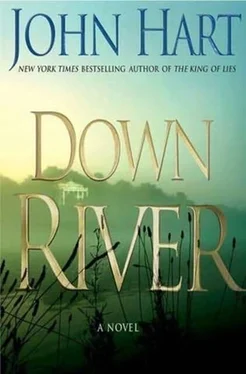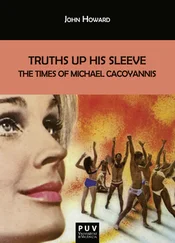I did not want to go through something like that again.
As I crossed the last field, I planned my assault on the day. Candy’s brothers were still out there and somebody needed to talk to them. I’d try to see Dolf again. Maybe they’d let me in. Maybe he’d come to his senses. I did not have names for the bookmakers in Charlotte, but I had an address and descriptions. I could identify the two who had attacked Danny four months earlier. Maybe Robin could talk to somebody at Charlotte P.D. I needed to talk to Jamie. Check on Grace.
The funeral was at noon.
The house was empty when I returned. No note. The phone rang as I was about to leave. It was Margaret Yates, Sarah’s mother.
“I called your father’s house,” she explained. “A young woman told me I might find you at this number. I hope you don’t mind.”
I pictured the old lady in her grand mansion: the withered skin and small hands, the hate-filled words she pushed out with such conviction. “I don’t mind,” I said. “What can I do for you?”
She spoke smoothly, but I sensed great hesitation. “Did you find my daughter?” she asked.
“I did.”
“I wondered if I could prevail upon you to come see me today. I know it’s an unusual request…”
“May I ask why?”
Her breath was heavy over the line. Something clattered in the background. “I didn’t sleep last night. I haven’t slept since you came to my house.”
“I don’t understand.”
“I tried to stop thinking about her, but then I saw your picture in the paper; and I asked myself if you’d seen her. What you’d talked about.” She paused. “I asked myself what might be good in the life of my only daughter.”
“Ma’am-”
“I believe that you were sent to me, Mr. Chase. I believe that you are a sign from God.” I hesitated. “Please, don’t make me beg.”
“What time did you have in mind?”
“Now would be ideal.”
“I’m very tired, Mrs. Yates, and I have a great many things to do.”
“I’ll put on coffee.”
I looked at my watch. “I can give you five minutes,” I said. “Then I’ll really have to go.”
The house was as I’d last seen it, a great white jewel on a bed of green velvet. I paused on the porch, and the tall doors split as the right side swung open. Mrs. Yates stood in the dim space, bent at the neck, somber in crisp gray flannel and a lace collar. The smell of dried orange peels wafted out, and I wondered if anything ever changed in this place. She held out a hand that felt dry and hollow-boned. “Thank you so much for coming,” she said. “Please.” She stepped aside and swept an arm toward the dim interior. I walked past her and the door settled into its frame.
“I can offer you cream and sugar for your coffee, or something harder if you prefer. I’m having sherry.”
“Just coffee, please. Black.”
I followed her down a wide hall full of somber art and fine-grained furnishings. Heavy drapes defended the interior from excessive sunlight, but ornate lamps burned in every room. Through open doors, I saw leather that gleamed and further hints of subdued color. A grandfather clock ticked somewhere in the vastness.
“You have a lovely home,” I said.
“Yes,” she agreed.
In the kitchen, she lifted a tray and carried it into a small sitting room. “Sit,” she said, and poured coffee from a silver service. I sat on a narrow chair with hard arms. The china cup felt as light as spun sugar.
“You think me cold,” she said without preamble. “In the matter of my daughter, you think me cold.”
I lowered the cup to its saucer. “I know something of family dysfunction.”
“I was rather harsh when last we spoke of her. I would hate for you to think me either senile or without heart.”
“It can get complicated. I would not presume to judge.”
She sipped her sherry, and the crystal stemware made a sound like bells as she set it on the silver tray. “I’m not a zealot, Mr. Chase. I do not condemn my daughter because she worships the trees and the dirt and God knows what else. I would be heartless, indeed, to cast out my only child for reasons as intangible as mere differences of faith.”
“Then, may I ask why?”
“You may not!”
I leaned back, laced my fingers. “With all due respect, Mrs. Yates, you broached the subject.”
Her smile was tight. “You’re right, of course. The mind wanders and the mouth, it seems, is more than willing to follow.”
She trailed off, looked suddenly uncertain. I leaned forward so that our faces were close. “Ma’am, what is it that you want to discuss with me?”
“You found her?”
“I did.”
She lowered her gaze and I saw powder blue lines in the paper-thin eyelids. Her lips pursed, thin and bloodless under lipstick the color of a December sunset.
“It’s been twenty years,” she said. “Two decades since last I saw or spoke to my daughter.” She lifted the sherry and drank, then lay a light hand on my wrist. Her eyes widened as her voice cracked. “How is she?”
I leaned away from the desperation in her face, the quiet, weak hunger. She was an old woman, alone, and after two decades, the wall of anger had finally crumbled. She missed her daughter. I understood. And so I told her what I could. She sat perfectly still and absorbed everything I said. I sugarcoated nothing. By the end, her eyes were down. A large diamond spun loosely on her finger as she twisted the ring.
“I was in my mid-thirties when I had her. She was… unplanned.” She looked up. “She was more child than woman the last time I saw her. Half her life ago.”
I was confused. “How old is your daughter?” I asked.
“Forty-one.”
“I assumed that she was much older.”
Mrs. Yates frowned. “It’s the hair,” she said, gesturing at her own hair, thin and white and lacquered. “An unfortunate family trait. Mine turned white in my early twenties. Sarah was even younger.”
She levered herself out of the chair and crossed the room on stiff ankles. From a shelf beside the fireplace, she took down a photograph in a polished, silver frame. A smile bent the lines in her face as she stared at it. One finger trembled on the glass as she traced something I could not see. She came back to her seat and handed me the photograph. “That’s the last one I ever took of her. She was nineteen.”
I studied the picture: the animal grin and stark green eyes, the blond hair shot with white. She rode bareback on a horse the color of a northern sea. Fingers twisted into the mane. One hand lay flat on the animal’s neck as she leaned forward as if to whisper in its ear.
I felt a momentary disconnect, as if the words that came were not my own. “Mrs. Yates, earlier, I asked about the reasons that you and your daughter stopped speaking.”
“Yes.” Hesitant.
“I’d like to ask you again.” She balked, and I glanced again at the photo. “Please,” I said.
She folded her hands in her lap. “I try not to think of it.”
“Mrs. Yates…?”
She nodded. “Perhaps it will help,” she said, but a minute passed before she spoke again. “We fought,” she finally said. “That may seem normal to you, but we did not fight as most mothers and daughters would. She knew how to hurt me at an early age, knew where to put the knife and how to twist it. In honesty, I suppose I hurt her, too, but she refused to obey the rules. And they were good rules,” she said quickly. “Fair rules. Necessary ones.” She shook her head. “I knew she was destined for great failure. I just didn’t think that it would find her so young.”
“What failure?”
“She was already confused. Running all over the county like some kind of druid. Arguing with me about the meaning of God. Smoking pot and God knows what else. I swear to you, it was enough to make a mother weep for a daughter’s soul.”
Читать дальше












